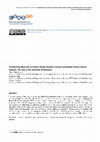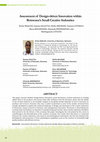Papers by Paulson LETSHOLO

Current business models have over the years led to increased consumption of resources; energy and... more Current business models have over the years led to increased consumption of resources; energy and materials. The concept of Sustainable Product-Service Systems (S.PSS) could be more meaningful when applied to Distributed Renewable Energy systems (DRE) to reduce resource consumption. A shift in focus for Institutions of Higher Learning traditionally offering product design degrees is imperative for them to produce designers that are responsive and proactive in addressing the global sustainability crisis. This paper explores through a case study, how S.PSS applied to DRE can be taught and learned by students enrolled in a traditional product design degree. The major findings informing pedagogy show that the context can be used as an interactive resource to inform teaching and learning in non-conventional learning spaces. Students now tackle design challenges from a product service systems approach which shows a positive transition towards service-oriented solutions leading to a sustainable culture.
Key Words: sustainable product service systems; service economy; teaching and learning; distributed renewable energy systems.
MX Design Conference 2009 32 Design for social construct & economic growth in the 21st century Pa... more MX Design Conference 2009 32 Design for social construct & economic growth in the 21st century Paulson Letsholo PB Letsholo@ tudelft. nl Henri Christiaans HHCM Christiaans@ tudelft. nl TU Delft, Industrial Design Engineering, Zuid Holland, The Nederland's Shorn ...

Lack of an innovative programme aimed at instilling a culture of continuous innovation among Bots... more Lack of an innovative programme aimed at instilling a culture of continuous innovation among Botswana’s Small Micro Enterprises (SME) has been cited as an impediment for the growth of this sector. SME are open to domestic and foreign competition, and mostly threatened by imports from other countries. The successful exploitation of new innovative ideas has driven economic progress of many countries. The challenge for Botswana’s SME is to compete on the basis of unique value and innovation. Innovation matters because it means higher quality and better products, more efficient services and higher standards of living. The absence of design and innovation can lead to business stagnation and loss of jobs. It is against this background that the researchers conducted a case study to audit the level of innovation in Botswana’s SME sector. Botswana’s economic diversification and growth is based on the success of the SME, whose success in turn is based on their innovative abilities. A case stu...

This paper assesses whether design-driven innovation assists Botswana’s creative industries in cr... more This paper assesses whether design-driven innovation assists Botswana’s creative industries in creating added value to the products and services they offer. Evidence from the literature shows that the ability of any creative industry to successfully compete in the global market depends on how it innovates its products and services. However, this area is under-researched as none of the studies reviewed have actually attempted to explore the technical landscape of design and innovation in the creative industries in Botswana, except research in business and management innovation. Botswana is diversifying her economy from overreliance on minerals to manufacturing and tourism. Since creative industries elsewhere have proved to be the drivers of the economy, this paper investigates the role played by this sector in contributing to the diversification of the country’s economy. The results show that there is a weak link between the creative industries and research and development institutions and this has hindered the development and promotion of local technological capabilities such as the creation of sustainable high quality products and efficient services.
Books by Paulson LETSHOLO

Beyond Graduate Attributes: Embedding Work Integrated Learning. Transformative Pedagogies in the Visual Domain, 2018
Nowadays, it is no longer sufficient for graduates to simply acquire specific discipline knowledg... more Nowadays, it is no longer sufficient for graduates to simply acquire specific discipline knowledge to guarantee one’s employment at the completion of any study programme. The employers are demanding graduates who can bring value to the workplace. Such graduates should possess graduate attributes which go beyond the usual technical knowledge and skills of a specific discipline to include values and attitudes as well as skills for lifelong learning which potential employers might find desirable. In order to equip students with graduate attributes, many universities have redefined their curricula to incorporate these in the teaching and learning pedagogies for undergraduate programmes to better prepare graduates for the world of work and selfemployment. A case study was conducted with students from the University of Botswana, and University of Applied Sciences and Arts Northwestern, Switzerland.Students collaborated on a week-long cross-cultural project under the theme ‘water’ and the students’ task was to co-create possible solutions in harvesting, recycling,
reuse and conservation of water which is a precious resource in Botswana. At the end of the project, a survey was conducted for students to score the level of the perceived attainment of a set of graduate attributes presented to them. The results show that the
top six graduate attributes perceived to have been attained by students of both universities include: impact on professional development, opportunities for collaborative work, social skills, design with empathy, opportunities for intellectual curiosity, and critical thinking skills. Giving students’ real-life, meaningful projects enabled them to simulate the required graduate attributes when they work with different stakeholders. The chapter concludes that universities should review their teaching and learning pedagogies to make them more relevant, appropriate and effective to address the integration and the attainment of graduate attributes so as to produce a competent future workforce.










Uploads
Papers by Paulson LETSHOLO
Key Words: sustainable product service systems; service economy; teaching and learning; distributed renewable energy systems.
Books by Paulson LETSHOLO
reuse and conservation of water which is a precious resource in Botswana. At the end of the project, a survey was conducted for students to score the level of the perceived attainment of a set of graduate attributes presented to them. The results show that the
top six graduate attributes perceived to have been attained by students of both universities include: impact on professional development, opportunities for collaborative work, social skills, design with empathy, opportunities for intellectual curiosity, and critical thinking skills. Giving students’ real-life, meaningful projects enabled them to simulate the required graduate attributes when they work with different stakeholders. The chapter concludes that universities should review their teaching and learning pedagogies to make them more relevant, appropriate and effective to address the integration and the attainment of graduate attributes so as to produce a competent future workforce.
Key Words: sustainable product service systems; service economy; teaching and learning; distributed renewable energy systems.
reuse and conservation of water which is a precious resource in Botswana. At the end of the project, a survey was conducted for students to score the level of the perceived attainment of a set of graduate attributes presented to them. The results show that the
top six graduate attributes perceived to have been attained by students of both universities include: impact on professional development, opportunities for collaborative work, social skills, design with empathy, opportunities for intellectual curiosity, and critical thinking skills. Giving students’ real-life, meaningful projects enabled them to simulate the required graduate attributes when they work with different stakeholders. The chapter concludes that universities should review their teaching and learning pedagogies to make them more relevant, appropriate and effective to address the integration and the attainment of graduate attributes so as to produce a competent future workforce.